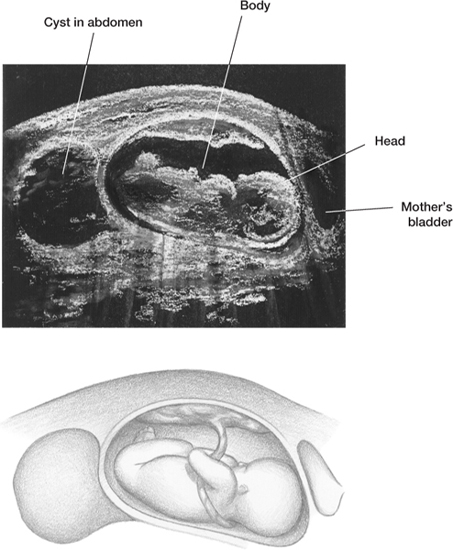1. How Big Is Your Baby?
Your baby now weighs about 10½
ounces (300g); its crown-to-rump length is about 7¼ inches (18cm). It’s
about the size of a large banana.
2. How Big Are You?
When your healthcare provider measures
your uterus, it’s almost 8½ inches (21cm) from the pubic symphysis.
Your weight gain should be between 10 and 15 pounds (4.5 and 6.3kg).
By this week, your waistline is
definitely gone. Your friends and relatives—and strangers—can tell
you’re pregnant. It would be hard to hide your condition!
3. How Your Baby Is Growing and Developing
Rapid growth rate of your baby has
slowed. However, the baby continues to grow and to develop as different
organ systems within the baby mature.
Baby’s digestive system is functioning in
a simple way, and baby swallows amniotic fluid. Researchers believe
swallowing may help develop the digestive system. It may also condition
the digestive system to function after birth. After swallowing fluid,
baby absorbs much of the water and passes unabsorbed matter as far as
the large bowel. With ultrasound, you can see the baby swallowing.
Studies
indicate full-term babies may swallow as much as 17 ounces (500ml) of
amniotic fluid in a 24-hour period. It contributes a small amount to
baby’s caloric needs and may contribute essential nutrients to the
developing baby.
Meconium
During pregnancy, you may hear the term meconium
and wonder what it means. It refers to undigested stuff in baby’s
digestive system. Meconium is made mostly of cells from the lining of
baby’s gastrointestinal tract and swallowed amniotic fluid.
It is a greenish-black to light-brown
substance. It passes from baby’s bowels before delivery, during labor
or after birth. If present during labor, meconium may be an indication
of fetal stress.
If a baby passes meconium into
amniotic fluid, he or she may swallow the fluid. If meconium is inhaled
into the lungs, baby could develop pneumonia or pneumonitis. For this
reason, when meconium is found at delivery, an attempt is made to
remove it from baby’s mouth and throat with a small suction tube.
4. Changes in You
Swelling
You may notice swelling in various parts
of your body, especially in your lower legs and feet, particularly at
the end of the day. If you’re on your feet a lot, you may notice less
swelling if you can rest during the day.
Swelling often begins around week 24.
Seventy-five percent of all pregnant women suffer from swollen fingers,
ankles and feet. If your feet swell, it can help to wear pregnancy
support stockings to avoid blood from pooling in your feet. Ask your
healthcare provider about them.
Your face may look fuller during
pregnancy because of the weight you are supposed to gain and from water
retention, which can cause some swelling in the facial area.

Ultrasound may be used to detect problems. In this ultrasound of
a baby in utero, there is a cyst in the mother-to-be’s abdomen.
The interpretive illustration clarifies the ultrasound image.
There are some
things you can try to help control swelling. Prenatal massage may be
good. Eat plenty of raisins and bananas; both are high in potassium. A
potassium deficiency may allow your cells to fill with water,
increasing swelling. Flexing your feet and ankles during the day helps
keep blood circulating. You can also try standing on your tiptoes—it
helps pump blood back to the heart. When sitting, press your toes down
as if you were pushing on the gas pedal of your car to accomplish the
same thing.